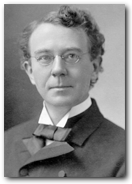Famous New Jersey Mason
Foster McGowan Voorhees
(1856-1927)
![]()

|
Foster McGowan Voorhees left a lasting imprint on the social fabric of New Jersey and on Rutgers. As New Jersey’s governor, the lifelong bachelor implemented reforms that benefited orphans, improved conditions for prison inmates, and protected the environment. As a philanthropist, he gave generously of his time and estate. Two stately buildings and the scenic promenade on the New Brunswick campus bear his family name: Voorhees Chapel, Voorhees Hall, and Voorhees Mall. A native of Clinton, young Foster was a brilliant student who entered Rutgers College at 15 and graduated second in his class in 1876. He taught at the Rutgers Grammar School for three years then ran a successful law practice in Elizabeth. He served with distinction in both the state assembly and, later, the state senate. New Jersey voters elected him governor in 1899 at age 43, the youngest on record. During his term, he oversaw the creation of the Board of Children’s Guardians, allowing the removal of children from the institutional almshouses to be placed with loving families. He segregated petty criminals from the more serious, chronic offenders and encouraged parole and probation for those who committed minor infractions of the law. He retired from public office in 1902, when he was elected a life trustee of Rutgers. After Mr. Voorhees’ death in 1927, one of his students, W.H.S. Demarest, a former Rutgers president, eulogized his teacher as a man whose sterling characteristics, coupled with a kindly manner, marked his adult life and won him universal affection and respect. New Jersey Assemblyman 1888-90. New Jersey Senator 1894-98, President 1898. Governor of the State of New Jersey 1899-1902. Lodge: Washington 33
|